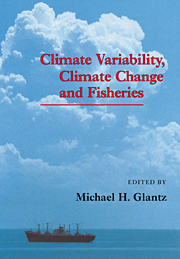Book contents
- Frontmatter
- Contents
- 1 Introduction
- 2 King crab dethroned
- 3 The rise and fall of the California sardine empire
- 4 El Niño and variability in the northeastern Pacific salmon fishery: implications for coping with climate change
- 5 The US Gulf shrimp fishery
- 6 The menhaden fishery: interactions of climate, industry, and society
- 7 Maine lobster industry
- 8 Human responses to weather-induced catastrophes in a west Mexican fishery
- 9 Irruption of sea lamprey in the upper Great Lakes: analogous events to those that may follow climate warming
- 10 North Sea herring fluctuations
- 11 Atlanto-Scandian herring: a case study
- 12 Global warming impacts on living marine resources: Anglo-Icelandic Cod Wars as an analogy
- 13 Adjustments of Polish fisheries to changes in the environment
- 14 Climate-dependent fluctuations in the Far Eastern sardine population and their impacts on fisheries and society
- 15 The Peru–Chile eastern Pacific fisheries and climatic oscillation
- 16 Climate change, the Indian Ocean tuna fishery, and empiricism
- 17 Climate variability, climate change, and fisheries: a summary
- Index
16 - Climate change, the Indian Ocean tuna fishery, and empiricism
Published online by Cambridge University Press: 13 October 2009
- Frontmatter
- Contents
- 1 Introduction
- 2 King crab dethroned
- 3 The rise and fall of the California sardine empire
- 4 El Niño and variability in the northeastern Pacific salmon fishery: implications for coping with climate change
- 5 The US Gulf shrimp fishery
- 6 The menhaden fishery: interactions of climate, industry, and society
- 7 Maine lobster industry
- 8 Human responses to weather-induced catastrophes in a west Mexican fishery
- 9 Irruption of sea lamprey in the upper Great Lakes: analogous events to those that may follow climate warming
- 10 North Sea herring fluctuations
- 11 Atlanto-Scandian herring: a case study
- 12 Global warming impacts on living marine resources: Anglo-Icelandic Cod Wars as an analogy
- 13 Adjustments of Polish fisheries to changes in the environment
- 14 Climate-dependent fluctuations in the Far Eastern sardine population and their impacts on fisheries and society
- 15 The Peru–Chile eastern Pacific fisheries and climatic oscillation
- 16 Climate change, the Indian Ocean tuna fishery, and empiricism
- 17 Climate variability, climate change, and fisheries: a summary
- Index
Summary
Introduction
The unique characteristics and opportunities within the western Indian Ocean are finally being exploited, after many decades of conservative commentary and misplaced concern. Although there were several local and regional fisheries for tropical tunas in the western Indian Ocean that have been operating for periods often exceeding written history, none of these had developed to any remarkable degree because of the types of gear being used, and the long distances from landing ports to processing facilities and markets.
The background history behind the development of the western Indian Ocean tuna fishery, particularly within and about the Seychelles Plateau, is unique and worthy of documentation, even though that development is still ongoing. For various reasons this particular fishery thrives, while development efforts in other ocean areas over recent decades have been marginal; some have even regressed. It began in parallel with several similar, but less successful, efforts.
During the last two decades, there have been several national efforts to develop nearshore fisheries for tunas. Projects have mostly been effective only at locating resources, but have not been very effective at transferring technology needed to extend fishing grounds into open ocean areas. Projects have come and gone from Indonesia, Sri Lanka, Thailand, India, Somalia, Zanzibar, Madagascar and, recently, the Maldives and the Seychelles (Fig. 16.1). The latter two have been most successful, but for very different reasons.
- Type
- Chapter
- Information
- Climate Variability, Climate Change and Fisheries , pp. 377 - 416Publisher: Cambridge University PressPrint publication year: 1992
- 3
- Cited by



